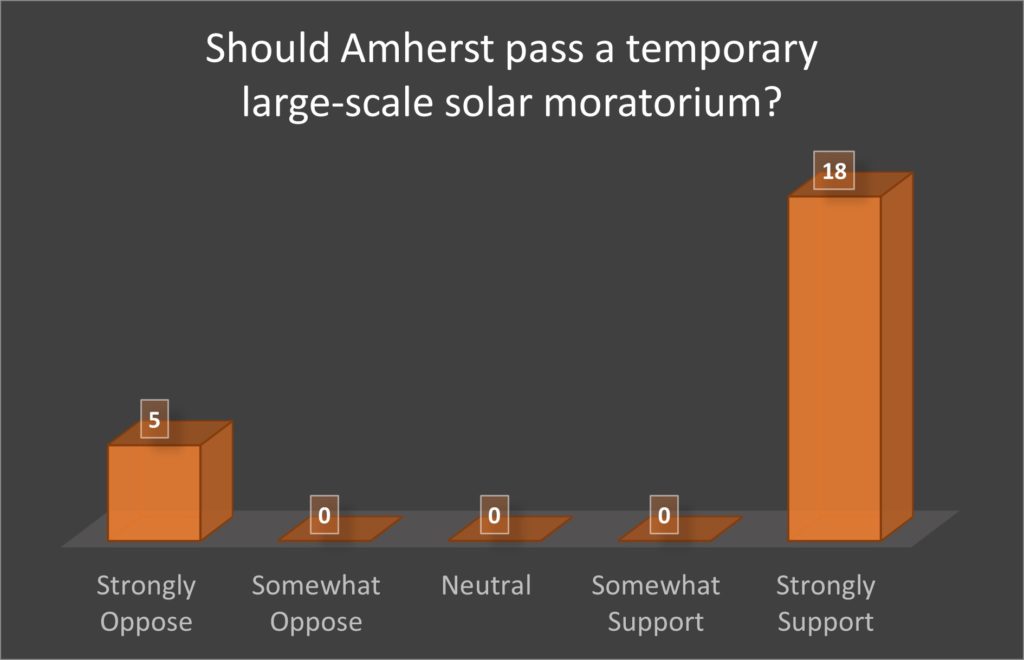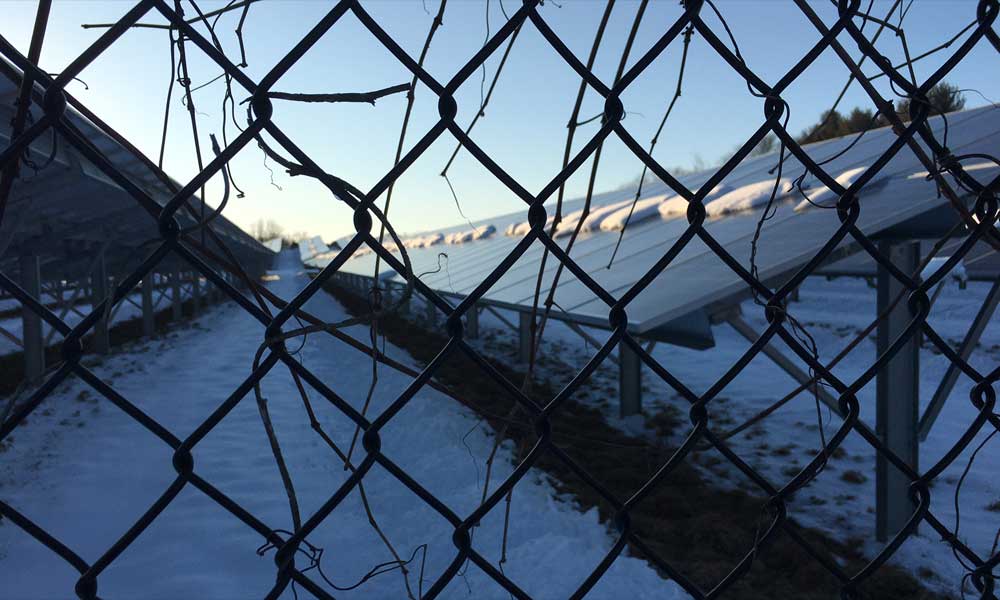Majority Polled Favors Solar Moratorium

Results of Speak Up! Should Amherst Declare A Temporary Moratorium On Large Scale Solar? Survey
Indy readers were asked where they stand on the question to go before Town Council on February 28: Should Amherst enact a temporary moratorium on the permitting and approval of large-scale ground mounted solar energy systems, including photovoltaic installations?
Twenty-three people responded, all feeling strongly about their position. Five respondents (22%) expressed strong opposition to the moratorium, while eighteen (78%) strongly support the measure.

Eighteen respondents explained the reasons for their positions. These are listed below, grouped by whether they oppose or support a moratorium.
Strongly Oppose
1.
| Explanation | We need more solar power, now. Why do we need a moratorium while we work on a new law? I agree that better rules and regulations are needed, but a moratorium on new construction will only result in more time being taken to develop a new set of rules and laws. New rules and laws will be enacted much more quickly if there is no moratorium! So, stop this foolishness of a moratorium and get on with both more solar power and better rules to manage its development. |
2.
| Explanation | We need this. Why are people against solar power? Why is this group against EVERYTHING positive happening in town? If you don’t like the progress Amherst is working towards, no one is forcing you to stay living here. After all, it is significantly cheaper to live in other towns close by. |
Strongly Support
3.
| Explanation | I agree there needs to be well-thought-out consideration of forest conservation/species habitat vs. clear-cutting for solar. A bylaw would require consideration of tradeoffs in an ecologically and geographically thoughtful way. Part of the question should be if we are allowing development of forested lands by for-profit developers, is there a way to ensure future transparency of land use management, some portion of profits for mitigation, and insurance that investments are being set aside for future decommissioning when solar panels age out? I don’t know whether these things are already regulated at state or local scale? Finally, I’d also like to see if we could encourage/subsidize more solar on infrastructure e.g., commercial roofs, full house roofs where residents might themselves need only a few panels, houses currently without solar, etc. |
4.
| Explanation | We depend on forests for carbon sequestration, water quality, soil quality, preventing desertification, and much more. Our forests here need our stewardship and protection and are more beneficial than destroying them and replacing them with the manufacture and installation of large-scale ground mounted solar devices. This is long-range thinking, this is intelligent planning, this is common sense. I sense that vast advances in alternative energy resources, including new approaches to solar, are on the horizon, and in the meantime, we should seriously pressure electric companies to construct large scale ground mounted solar installations under their own networks of power lines, which are accessible, maintained, completely open to the sun, and on already deforested land, as suggested at a recent Planning Board meeting. |
5.
| Explanation | Western Mass’s best use in fighting climate change is to support our forests, which provide long term services without requiring mining, manufacture, transportation of objects that will soon be replaced by better technologies and siting, and if removed will leave devastation and poisons behind. |
6.
| Explanation | There is plenty of already-developed land with impervious surface – parking lots and rooftops, in particular – to accommodate Amherst’s share of PV, and our neighboring town Hadley has even more such space, all of which should be considered before farm and forest land is converted to such an industrial use. |
7.
| Explanation | Contrary to what a committee member recently asserted, Amherst does not have a good reputation of being able to “walk and chew gum.” Amherst needs the moratorium to allow the time to develop a solar by-law based on best practices for siting large scale solar projects. Time and time again, the town has made decisions that were short-sighted, ignored problems and moved forward with plans that did not have public support and were ultimately deemed unwise. Two examples, in 2007, the town purchased portables at Marks Meadow School costing $275K that were paid for but never used and ultimately bulldozed; after Town Meeting approved an additional 5 feet height on new buildings downtown, the Planning and Zoning Boards issued waivers and permits that allowed additional height and eliminated setbacks, which is how 5-story buildings downtown came to be built up to the sidewalks. Along with the need to tackle climate change in light of the critical role played by forests in sequestering carbon, and to carefully consider the factors that allowed environmental damage from poorly sited large scale solar projects in Williamsburg and Conway, Amherst would be wise to take the time to get this right. |
8.
| Explanation | Like the last moratorium (which failed) this merely says that we should plan first before we build vast solar installations. A new by-law or an addendum to the existing zoning bylaw would mean that the town can responsibly consider issues of size, siting, and both intended and unintended consequences of such installations. Perhaps it is equally important to state what this moratorium proposal is NOT about. It is not about the value of solar energy. It is not about Amherst’s need for vastly increased capacities for alternative energy sources. Like any other zoning restrictions, it is about seeing Amherst and its surroundings as a whole community as well as seeing a particular site and its immediate surroundings. Regarding the forests vs solar installations debate, sentiment is clearly on the side of forests, and rightfully so. A moratorium will give that debate a considered public airing before a decision is made. Let’s not answer the question before we have asked it. |
9.
| Explanation | Positions and the data provided pro and con. Let’s plan first. Seems the Planning Dept. and PB are already engaged in developing a bylaw, too late to comprehensively plan with a TC vote expected by Feb. 28th. |
10.
| Explanation | We need both forests & solar. If we want to cut fossil fuel emission quickly, let’s all stop driving! |
11.
| Explanation | Already enunciated well by others in favor of a moratorium |
12.
| Explanation | While the development of renewable energy sources is important, the willy-nilly erection of large-scale ground mounted solar systems risks doing more harm than good. Forests could be clear-cut, ecosystems damaged and treasured scenic vistas defaced. We should take the time to craft a zoning bylaw that considers all pros and cons of new solar installations. |
13.
| Explanation | I initially opposed the idea of a temporary solar moratorium for two reasons. 1) we need to get off fossil fuel in a hurry and LGMS is one way to do this. 2) The projects that led to this proposed pause are to be built on W.D. Cowls land. Cowls is a timber company – what they do is grow and cut down timber. So it seemed unreasonable to ask them not to do this. But then I started reading and I found that the scientific and policy literature that was critical of unregulated development of LGSM and of deforestation to do so was far more voluminous than the literature that supported it – far more 1 like by a factor of something like 10:1. I learned that deforestation for LGSM is especially aggressive in MA . I learned of contamination of ground water from projects undertake without proper regulation in other communities. I learned more about the role of trees in carbon sequestration and the provision in some solar bylaws that requires reforestation as part of the permitting. I learned that there was much to be learned from how other communities had approached the challenge of sensible solar development. And I was compelled by the appeal of the Chair of Amherst’s ZBA who said that the board just didn’t have the tools to continue to evaluate such projects and needed a thoughtful bylaw in order to ensure that things are done right. And that’s the view that I now share – that a brief pause in new LGSM projects (the moratorium doesn’t impact other solar developments) will give the town a chance to develop an appropriate bylaw and make sure that solar development is done correctly in our town. The moratorium and its supporters are not anti-solar – far from it – supporters of the moratorium have been clear in their support for solar development and indeed have written pro-solar language into the revised version of the bylaw. The more, I have learned (and I continue to read on the subject) the more I think that to not take this brief pause to get things right and to write the bylaw that we should have written years ago – to not do this would be reckless and irresponsible. |
14.
| Explanation | I believe the town should determine where ground mounted solar will be beneficial and not harm water resources or cause erosion. The town also needs to determine how to achieve balance between the need for solar energy and the preservation of forests and farmland. We need a solar bylaw, and a moratorium would make time to create one. |
15.
| Explanation | Solar industry is a big and ridiculous lie |
16.
| Explanation | Opponents suggest that the Zoning Board of Appeals has approved several large projects with conditions under the provisions of the current bylaw. However, none are as big as are now being proposed and are not in neighborhoods where they would be an intrusion on people and the living environment. The Chair of the Zoning Board of Appeals reports that the general principles under Section 10.38, findings the ZBA must make to support decisions are inadequate. But one has to be in the Chair’s position to understand these subtleties, I guess. |
17.
| Explanation | It’s very important that the town take the time to create a solar bylaw pertaining to all solar development. We want to ensure that creating solar on rooftops, parking lots and brownfields is prioritized before siting it on any agricultural land. Plenty of bylaws have been created that we can look at and use for models. We might for example encourage large scale ground mounted solar that can also be used for agricultural purposes, I’m not for clear cutting forests for solar arrays because it doesn’t look to the future, to the potential increased sequestration over the long life of a forest as compared to the short life of a solar array. And it is myopic to look town by town for where to site solar when each town is very different, has different geography and population density. Ideally, for maximum resilience, large scale solar should be close to buildings that can use it during the daytime, behind the meter. Also, just fyi, Amherst can’t take credit in its climate goals for electricity created by large scale solar that is not “additional”, that is, solar that is simply fulfilling the state renewable portfolio standard requirements but not adding anything that would not otherwise be created anyway. That would be double counting it. I agree with Pat DeAngelis that the town can get busy implementing the many actions in our climate action plan while at the same time working on a new solar bylaw. No worries about losing time not taking action on climate in that case. We have many solutions we can be working on. |
18.
| Explanation | Amherst needs to carefully balance energy needs versus environmental impact. We cannot rush into large-scale solar installations until we better understand advantages as well as negative ramifications. We now have new zoning by-laws which were not carefully studied. Let’s not repeat such a huge mistake. |


1 thought on “Majority Polled Favors Solar Moratorium”